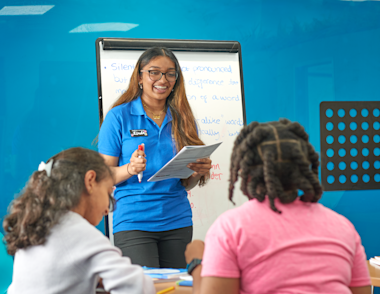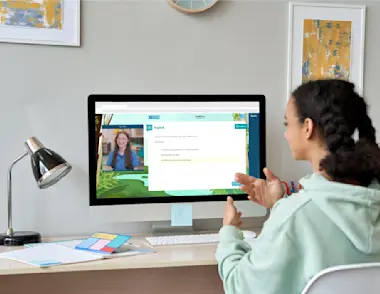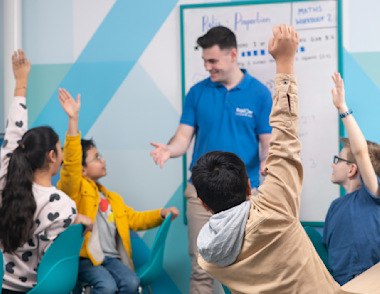11 Plus and entrance exam tuition
Non-verbal reasoning test tutoring
Non-verbal reasoning assesses how your child analyses visual information and solves problems with visual logic.
Geometry: Working out cube nets and how shapes look when folded
Sequencing: working out which diagram comes next in a sequence
Patterns: rotation and symmetry

How is non-verbal reasoning tested?
To succeed in this element of the exam children must be logical and understand maths concepts such as symmetry and rotation. Each non-verbal reasoning question will provide the children with a sequence of shapes that they must analyse. Questions could include 'find the next one in the sequence' or 'find the odd one out'.
Non-verbal reasoning challenges children to interpret visual problems, without the need to draw on prerequisite information. For this reason, it is seen as a 'pure intelligence' measure. To tackle the non-verbal reasoning exam with confidence children must be familiar with the different question types and practice to improve their speed and accuracy.

Non-verbal reasoning test questions
Depending on your child's individual needs we will tailor your child's session to build up their math skills. Our range of practice resources help your child feel familiar with the different types of non-verbal reasoning questions they may face.
Non-verbal reasoning example question:
Use the letter codes given in the below clues to work out the letters that replace ?? in the fifth clue.

In this test of pattern recognition, identify how the letters, shapes and symbols relate to one another to figure out the answer.
Answer: QC

Support before and after the 11 Plus exam
We believe in ensuring that your child is not only prepared for their 11 Plus exam, but ready and excited for the challenges at their new school!
That's why we provide:
Traditional paper-based and online activities in 11 Plus tuition sessions
Individualised maths and English tuition to develop core skills
The confidence and social skills to succeed in their new school
1:1 Session
11 Plus and Entrance Exams
Our tutors coach your child in the techniques needed to pass their exam and become a high achiever.
Find a centre in your area
11 Plus and Entrance Exams
Online Tuition
One-to-one tuition in a safe and secure online environment. Tutors support children using our smart learning tool and live video stream.
11 Plus and Entrance Exams
Online Tuition
One-to-one tuition in a safe and secure online environment. Tutors support children using our smart learning tool and live video stream.
11 Plus and Entrance Exams
In Centre Tuition
A tutor will support a group of up to 6 children with their own individualised work.
All our memberships are monthly and include:
Unlimited practice material
Progress reports for you and your child
Support with any questions and concerns from our team of managers
Appropriate safeguarding measures to ensure the welfare and safety of all children in centre and online.
Free resources
11 Plus resources
11 Plus Non-Verbal Reasoning FAQs
Why is non-verbal reasoning assessed in the 11 Plus exam?
Evaluating a child’s proficiency in non-verbal reasoning through the 11 Plus exam provides insights into their capability to interpret visual data and deduce conclusionsfrom it. These analytical abilities are crucial for subjects like maths, where solely relying on linguistic competencies will not be enough.
Diverse aptitudes define every child’s academic journey. While some might display a knack for linguistic tasks, others find their strengths in non-verbal territories. By incorporating non-verbal reasoning into the 11 Plus examinations, it ensures that students aren’t merely assessed based on their verbal abilities but are also recognised for their wider spectrum of cognitive strengths. Non-verbal reasoning tests highlight these strengths, offering a more well-rounded view of a child’s potential, beyond linguistic abilities.
How crucial is preparation for the 11 Plus non-verbal reasoning exam?
Preparing for non-verbal reasoning testsis important to achieving success. Proper preparation not only builds confidence but also familiarises students with the types of problems they may face, ensuring they can approach them with more clarity and precision. At Explore Learning, our specialised non-verbal reasoning tutoring offers tailored strategies and practice resources. By immersing students in our structured tutoring sessions, we equip them with the tools and techniques needed to excel in their assessments
What is Non-Verbal Reasoning?
Non-verbal reasoning refers to the ability to understand and analyse visual information and to solve problems using visual reasoning without the need for language. It encompasses skills such as recognising patterns, understanding sequences and deducing relationships between shapes and figures.
What Does Poor Non-Verbal Reasoning Mean?
Poor non-verbal reasoning indicates a difficulty in processing and interpreting visual data. A student witch challenges in this area might struggle with tasks like identifying patterns, understanding relationships between shapes or predicting the next item in the sequence. For someone with poor non-verbal reasoning, working witha professional tutor would be extremely beneficial
What Are The Types of Non-Verbal Reasoning?
Non-verbal reasoning can be categorised into various types based on the kind of skills being assessed. However, the common types include:
Spatial awareness: Understanding how shapes or patterns relate spatially.
Analogies: Identifying the relationships between two items and finding a third item that shares the same relationship with a given item.
Sequences: Determining the next item in a visualsequence.
Classification: Grouping items together based on shared characteristics.
Code breaking: Understanding the sequences where shapes are used as a form of code.
How Do You Prepare For a Non-Verbal Reasoning Test?
To prepare for a non-verbal reasoning test, it’s vital to familiarise yourself with the range of potential questions. Regularly practice is the key to success, including tackling practice papers and engaging in visual exercises. Additionally, seeking guidance, especially from tutoring services like Explore Learning, can significantly enhance the student’s skills, thanks to the tailored and structured sessions designed to enhance non verbal reasoning abilities.




